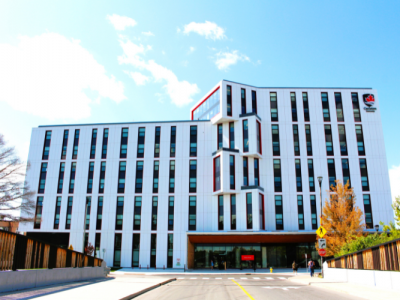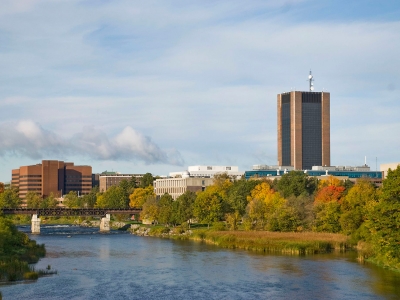Carleton University researchers Richard Amos and a team led by Marina Milyavskaya have received approximately $204,000 in combined funding from the Canada Foundation for Innovation’s (CFI) John R. Evans Leaders Fund (JELF) for work that will improve the healthy behaviour of Canadians and prevent the contamination of groundwater.
“Carleton is leading the way in research that is vital to the health of Canadians and the Canadian environment,” said Rafik Goubran, vice-president (Research and International). “We are grateful for CFI’s ongoing support of this important research.”
Milyavskaya and fellow researchers Rachel Burns and Katie Gunnell, professors in the Department of Psychology, will use the funds to develop the Centre for Health Behaviour and Well-Being in Daily Life.
Canadians have the opportunity to engage in healthy behaviours such as eating healthy foods, physical activity and taking medication as prescribed. Yet despite knowing the benefits of such regimens, many people struggle to engage in them. Healthy behavior has the potential to prevent staggering economic and personal burdens which cost Canadians billions a year.
Research conducted at the centre will take a unique approach to studying associations between these health behaviours and mental health by examining participants in their natural environments. The team intends to uncover feasible methods relevant to the daily lives of Canadians to enhance health-promoting practices and reduce health compromising behaviours.
“This funding allows us to purchase state-of-the art equipment to outfit our new centre, and will push research in all of our labs to the next level,” said Milyavskaya. “Combining psychophysiological data with in-the-moment assessments will provide a clearer picture of the relation between an individual’s day-to-day mental health and health behaviours.”
Groundwater is an important source of healthy drinking water for much of Canada and the world, yet this resource is threatened by human activity, including resource extraction. Amos is investigating sources of heavy metal contamination from hard-rock mining and oil sands extraction.
“My research will use a number of approaches to understand the mechanisms that control the movement of metal contaminants in groundwater, soils and sediment, over the long and short term,” said Amos, professor at the Global Water Institute and Department of Earth Sciences. “Mining in Canada generates a substantial portion of gross domestic product, but it requires careful management to mitigate environmental risks.”
In addition to many operating mines, Canada’s long history in the industry has resulted in abandoned mines that require assessment and possible remediation. This research will enable mining companies and governments to manage mining waste with greater confidence, resulting in greater protection of the environment while minimizing costs.
Amos’s research group has successfully combined field studies to understand real-world complexity, laboratory studies to isolate and understand specific phenomena, and numerical modelling studies to provide quantification and a deeper interpretation of results. CFI funding will support new equipment that will allow the team to continue developing this world-class research program and providing training for the next generation of groundwater scientists.
Media Contact
Steven Reid
Media Relations Officer
Carleton University
613-520-2600, ext. 8718
613-265-6613
Steven_Reid3@Carleton.ca
Carleton Newsroom: https://newsroom.carleton.ca/
Follow us on Twitter: www.twitter.com/Cunewsroom
Need an expert? Go to: www.carleton.ca/newsroom/experts
Monday, August 12, 2019 in News Releases
Share: Twitter, Facebook



